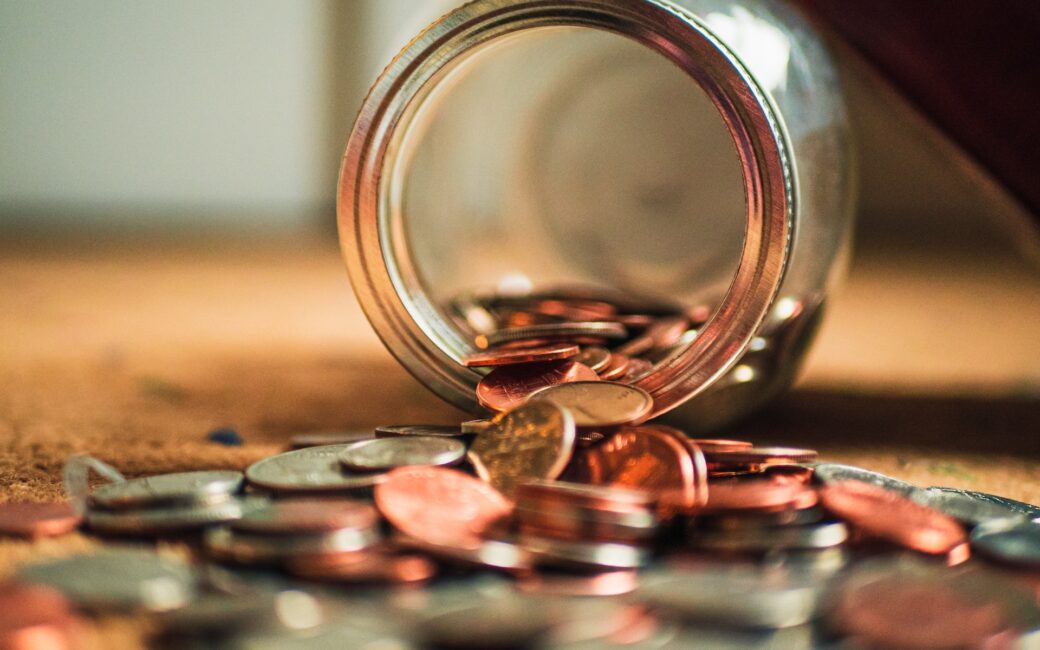Why Do We Have Money?
Because we built banks
and banks are houses
we stuff with money,
then wonder where it went.
When I wash the applesauce jar,
to put your money inside,
I mean for you to see it—terrarium
of growth and potential, experiment
in value added, for how else
to understand the glass walls
of money? A lesson never really learned—
(I almost wrote earned). You put
money in a jar, in a bank,
and is it yours? Where does it go?
You take it out and place it into the open
palm of the ice cream truck driver
for a strawberry shortcake bar,
because it’s your dad’s favorite,
and so, yours now too—money is like that,
for a time. It costs $4 from the truck,
$1.25 from the store, and 50 cents
from the freezer of my childhood.
What a steal! What a bargain!
And I didn’t (couldn’t) even
know it then. I’ll trade you lick
for lick and still not get any
closer to eating the whole,
and when I give it to you,
(because nothing I consume is mine
alone) it runs sticky-sweet
down your chin, your arms,
your shirt worn exactly once,
ruined. My mother used to say
“wash your hands” after touching
money, but to be real, you might only
know it in plastic. (You should still
wash your hands). Already, the glass jar,
an exhibit in a museum of money
next to the ceramic pigs, pillowcases,
mattresses, briefcases of money.
My mother used to say “money doesn’t buy
you happiness, but the lack of it
can make you very unhappy.” For a time,
I couldn’t understand how
something full of germs and grime
could also be something you’d want
so much you’d bet your life upon it,
or if not that life,
then the life you bought with it,
or the life you’d show others
you think you have with it,
or the life someone else
wanted you to have with it. Somewhere
in all that between desires
and survival, memory and projection
is the jar. Don’t forget about the jar.
Your job is to believe not that it exists,
but how much it’s worth.
Sara R. Burnett
Sara R. Burnett is the author of Seed Celestial (2022), winner of the Autumn House Press Poetry Prize. She has published in Barrow Street, Copper Nickel, PANK, RHINO and elsewhere. She holds an MFA from the University of Maryland, and a MA in English Literature from the University of Vermont. Previously, Sara worked as a public high school English teacher. She also writes picture books. She lives in Maryland with her family. Her website is: www.sararburnett.com
Why Do People Die?
Because eight billion people multiplied forever is too much.
Because you and me and the daffodils we planted last fall mostly came back.
Because be reasonable.
Mayflies only live for a day.
And monarchs know where to migrate without ever having been there before.
Because when you ask, what I hear you really asking is Could you? Could I?
Because the sound of your footsteps on the stairs are those I’d know anywhere.
Because the moon of my mother
is also the moon of you, my daughter.
And the sun will burn into a giant red ball, but not in our lifetimes.
Because even when the tomatoes are ripe, the kale has bolted.
Because I couldn’t stand the thought of that spider’s sac of eggs hatching on our porch.
Because I found the golden strands
of your hair on my hairbrush this morning.
And the doctor, looking at us both, said genetics doesn’t favor that combination.
Because do you remember
pulling the bedsheets over your head pretending to be invisible?
And me pretending not to hear you giggling underneath?

